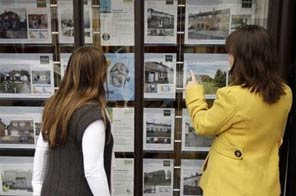British home prices rise in July: survey
LONDON: British home prices rose by 1.1 percent in July from the level the previous month, but fell over 12 months, a survey from home-loans provider Halifax showed on Wednesday.
Halifax -- part of the state-controlled Lloyds Banking Group -- added that the prices of homes in July were 12.1-percent lower compared with the level in the same month of 2008.
"Demand for homes has risen, albeit from a very low base, since the start of the year, driven by improvements in affordability and low interest rates," said Halifax housing economist Martin Ellis in a statement.
He added: "Higher demand has combined with the low levels of property available for sale to boost sales activity from exceptionally low levels and support prices over the past few months."
According to Halifax, the average cost of a British home stood at 159,623 pounds (187,877 euros, 270,462 dollars) in July 2009.
Last week, another major home-loans provider, Nationwide, had said British house prices rose by 1.3 percent in July from June, leaving the average cost of a home at almost 159,000 pounds.
Nationwide had also said prices were 1.3 percent higher so far this year and could finish slightly higher for the year as a whole.
"The significant rise in house prices in July reported by both the Halifax and the Nationwide -- following on from other increases -- will obviously fuel speculation that the housing market has turned decisively," said IHS Global Insight economist Howard Archer.
"It has benefited in recent months from sharply reduced mortgage interest rates and the substantial fall in house prices from their 2007 peak levels.
However, he sounded a cautious note about a sustained rise in house prices amid a deep recession in Britain.
"We suspect that they will be prone to relapses over the coming months and we certainly do not think that a sharp sustained upward trend in house prices is in the process of developing," Archer added.
"Affordability pressures are starting to move back up at a time when the economic climate of recession, sharply rising unemployment and slowing wage growth is negative for the housing market."





